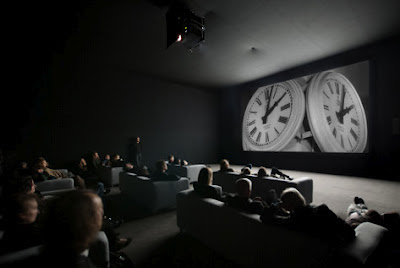Jul 23, 2012
The Clock
Now showing as part of the Lincoln Center Festival, this impressive art installation is well worth braving the endless lines to get in. (It's free). I breezed in last Saturday at 8:30 am but when I came back at 11 pm, I had to wait almost 2 hours to get in. And I intend to go back this week. It's addictive.
Artist Christian Marclay has created a unique timepiece. It's a real-time clock made of movie clips that have to do with time. If you walk in at 8 am, it is 8 am in the clips. A minute later, it is 8:01. It's a movie that lasts 24 hours. What is astonishing is that Marclay found clips that feature either clocks, watches or characters mentioning the time of almost every minute in the day. That's a lot of clips. The Clock is not just a collection of random clips but a flawlessly edited movie that is absolutely spellbinding in many levels.
First level, if you are a movie junkie, you are in heaven, as you recognize faces, favorite stars, scenes from films, even clips from movies you haven't seen, or wonder about actors whose faces elude you, try to place a movie name to a scene. Even if you don't know a movie star from Adam, you will still be hypnotized by Marclay's canny creation of sequences. He plays around with editing, intercutting scenes from different films to underscore the amazing trickery of the film cut. A character opens a door, he cuts to a different character entering a different room. A character from ancient history asks for the time; cut to the close up of a digital wristwatch. He makes us realize how used we are to this language of cuts that compress time and storytelling. Cinema as shorthand for time.
The sound editing is magnificent. Sound and music foreshadow scenes or leave the trail of a scene behind. For instance, a clip of the final scene of Truffaut's The 400 Blows, shows Antoine Doinel greeting the sea for the first time, but the clip is shown with the music from Jane Campion's The Piano, and then, in a lovely lyrical echo, it cuts to little Anna Paquin doing cartwheels on the beach.
Yet luckily for us, Marclay is not a movie buff. He is not making value judgements on the films he loves, or bragging about his film knowledge. He picks from good movies and bad, but he has a great eye and great timing and rhythm, and picks visually arresting scenes. The clips flow seamlessly, and work exactly like the narrative in a movie, creating emotional landscapes, humor and suspense, a compressed history of human beings in one day. You will find yourself deciding that you are leaving, say at 11, only to find yourself staying to see what is going to happen minutes later. It's about the human need to know what happens next.
There are sequences about death, sex, eating, working, playing, dreaming. So many people fumble in bed trying to turn off the alarm clock, so many people are always jumping out of bed, late for something important they are about to miss. You can clearly grasp the difference between the stillness of bonafide movie stars and actors of a lesser caliber. The Clock makes you conscious, if you are of this persuasion, of every single aspect of the artifice of film: light and shadows (particularly in black and white), the symmetry of the human face, framing, camera movement. You see the artistry of great masters like Polanski in a morning scene where Mia Farrow, in Rosemary's Baby, wakes up to reveal horrible scratches on her back; a marvel of elegance, irony, horror and revelation, in contrast to shoddy pans and careless camera work by lesser craftspeople.
The Clock can be deliciously overwhelming, almost disorientating, for movie obsessives.
On another level, The Clock is a visceral, subconscious experience. After I saw it, I had fabulous dreams about making movies with a cast of thousands. At some point you kind of forget about the movies and you focus on the actions, on the almost hypnotic, mantric quality of the footage with its spirals and repetitions and its relentless flow. You are transported by the sudden realization that you are extremely conscious of the time (you don't need to look at your watch, the movie tells you exactly what time it is), how long has it been since you've been transfixed by the illusion of time in the movies, in which one minute can be an eternity or it can go in a blink. You become extremely aware of time flowing or seeming to stop. Sometimes it is amazing that not even a minute has elapsed, and it seems to be 9 am forever, while sometimes you are caught in the reverie of this flowing continuum, and you realize you've been sitting there for three hours.
It is also a bizarre window into the human experience. A massive, delicious, extended dream sequence enacted by people who look much better than us, because they are the stuff of our deepest dreams.
Subscribe to:
Post Comments (Atom)

No comments:
Post a Comment